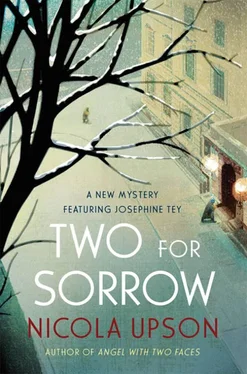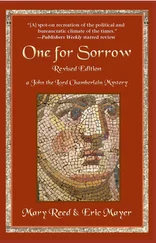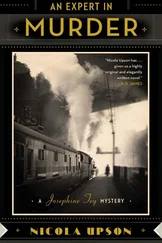She took the diary out of her bag and put it down on the table. Marta said nothing, wanting her to speak first. ‘This is all so foreign to me that I don’t even know how to begin to respond to it,’ Josephine said quietly.
‘Because it comes from another woman?’
‘What? No, don’t be silly. Why should that make a difference? No, it’s not that.’ She hesitated, realising that any attempt at an explanation would expose flaws in her own character which Marta might scorn, but she owed it to her to be honest. ‘It’s the intensity of it, Marta—the strength of how you feel. I’m not hard-hearted, I don’t lack imagination, but I’ve never felt like that about anyone. This love that you have for me—look how unhappy it’s made you. I haven’t often made people unhappy in my life.’
‘Perhaps they just didn’t tell you. But I didn’t hand it over for you to beat yourself up with—making you feel sorry for me was the last thing I wanted.’
‘I know, and that’s not what I meant.’ She left the sofa and sat down by the fire next to Marta. ‘I’m being much more selfish than that. You’re writing about emotions that terrify me—because of what they might do to both of us.’
Marta took her hand. ‘You really didn’t know, did you? I thought at first that you were just trying to brush it aside, but you had no idea how I felt until I told you.’
‘No, I didn’t. And I suppose, in hindsight, that makes me very stupid.’ She laughed. ‘Even Lettice had spotted it, for God’s sake.’
‘You’ve spoken to her about us?’
‘No, not really, but she saw I was upset the other night at dinner and I told her you’d been in touch. Lydia was there as well, much to my surprise. As you can imagine, it wasn’t the easiest of evenings.’
‘Surely you didn’t say anything to Lydia?’
‘Of course not, but I felt vile about it and we can’t go on like this.’ She took her hand away and stared resolutely into the fire. ‘Go back to Lydia, Marta. She loves you, and she’ll accept all the love you can give her in a way that I don’t think I ever could.’
‘So that’s still your answer? To come here as some sort of selfless ambassador for someone else?’ She got up and placed herself in front of the hearth, forcing Josephine to look at her. ‘And what if I did go back to Lydia? How would you feel? Tell me honestly, Josephine.’
There was no need to think about it: she had asked herself the same question many times. ‘Jealous, I suppose. Resentful. But mostly relieved—relieved that things could go back to normal.’
‘And what does normal mean? Sitting in Inverness where no one can touch you? God in heaven, Josephine—what on earth is the matter with you? Why submit to being half alive when life is so short? Don’t you ever want to watch the sun rise from somewhere that isn’t Crown Cottage or Cavendish Square? Breathe some different air for once?’
Josephine was used to Marta’s sudden bursts of anger by now, and it wasn’t that which unsettled her. ‘You don’t understand,’ she began hesitantly. ‘I’m perfectly happy as I am.’
‘I’m sure you are, but just remember—a dying man often says leave me alone, I want to die, but when he recovers, he trembles every time he remembers his foolishness.’
‘So being with you is a matter of life and death, is it? Jesus, Marta, I thought I was arrogant. Why don’t you just listen for a moment? I don’t want the things you think I should want, and telling me that I want them won’t make me change my mind.’
‘No? Then perhaps this will.’ Marta moved forward to kiss her. As Josephine tasted the gin on her mouth and felt the softness of her skin, she realised that she wanted more than anything to understand what it was like to lose the rest of the world in the sheer joy of one person. She felt Marta hesitate, surprised by her response; tenderly, she put her hand up to Marta’s face, pulling her closer in the hope that the sudden wonder of their intimacy would be enough to prevent her from coming to her senses. For a moment, the simple disbelief of what was happening was enough to convince her that nobody could be hurt by what they did, that she herself would remain unchanged by it; as hard as she tried to forget it, though, Josephine knew that Marta would change her, no matter how much she claimed not to want to, and she pulled away.
Confused and upset, she got up to leave but Marta reached the door first and slammed it shut. ‘I’m sorry,’ she said. ‘Please don’t go. Just stay and talk to me; we haven’t finished this yet. Please, Josephine—don’t leave like this.’
‘Let me get this straight. You want to arrest the secretary of a prestigious private club—a woman with a distinguished career in nursing and welfare, who is admired and respected by all and sundry, who was Lady Cowdray’s right-hand woman—on two counts of murder and one of attempted murder without any evidence at all? Are you out of your mind, Penrose?’
The chief constable glared across his desk, and Penrose took a deep breath. ‘I wouldn’t say that we’re without any evidence at all, Sir. Sergeant Fallowfield has traced three women who died just before Celia Bannerman left for Leeds and whose bodies were unidentified at the time. Two of them were recovered from the Thames, and the third went under a tube train.’ Penrose was convinced that one of these women was Eleanor Vale; certainly, there was no trace of her in the Leeds area as far as they could tell, and while this was in no way conclusive—people disappeared all the time, as he had explained to Josephine—he had not yet found anything which disproved his theory. ‘So it’s three counts of murder, really, and one of attempted murder. I think Celia Bannerman killed Eleanor Vale, and the current crimes …’
‘I’m not interested in the death of an ex-convict from thirty years ago, and neither should you be. From what you tell me, she should have hanged anyway and the pressure on us from the Home Office is rather more contemporary than you seem to realise.’
‘But that’s my point, Sir—there is a direct connection to what we’re investigating now. I think the Baker murders and Lucy Peters’s fall happened because Marjorie and her father found out about Vale’s death and were foolish enough to try to blackmail Miss Bannerman.’
‘Yes, yes, Penrose—I understand what you think . You’ve made that very clear. But I’ll ask you again—where’s your evidence? I don’t count three unidentified bodies who happened to depart this world just as Celia Bannerman was catching a train as incontrovertible proof. London’s full of women who disappear without leaving anyone behind to care—God knows it was even worse back then. And apart from anything else, the picture you paint of Bannerman’s well-intentioned interference in prison hardly fits with someone who could take a life simply because it was convenient to her.’
That was true, and the contradiction had made Penrose doubt his own theory at first; but, in his conversations with Celia Bannerman, he had detected a streak of steel, the kind of dedication and self-righteousness which occasionally blurred the boundaries between right and wrong, and he was willing to believe that her crusade to do good had, in her own mind, justified evil in its progress. The chief constable was clearly not in the mood to discuss the finer points of human nature, however, so he stuck to the basics. ‘Then there are the postcards I found in Lucy’s room,’ he said. ‘She and Marjorie had obviously been to see Ethel Stuke—the woman in the tea shop in Suffolk confirmed as much.’ It’s just as well she had, because the miraculous piece of evidence which he had hoped to find on Lucy’s camera had failed to materialise: all that the film would testify to was a girls’ day out, poignant in hindsight because of what had happened since, but nothing more than that.
Читать дальше












